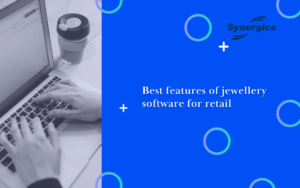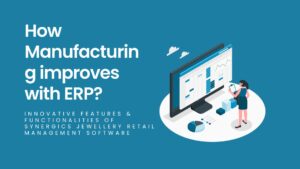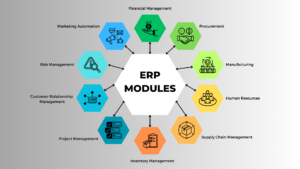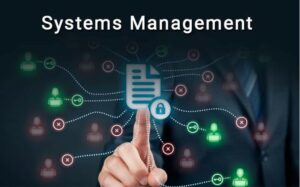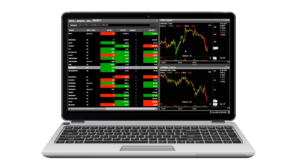Enterprise Resource Planning (ERP) software is the backbone of modern businesses, streamlining operations and providing crucial insights for decision-making. As technology advances, so do the capabilities and trends in ERP systems. Keeping up with these trends is essential for businesses aiming to maintain a competitive edge. In this comprehensive blog, we’ll explore the latest ERP software trends, providing insights into the future of the ERP industry and how businesses can leverage these developments for growth and efficiency.
1. Cloud ERP Trends
Embracing the Cloud
Cloud-based ERP solutions are becoming increasingly popular due to their flexibility, scalability, and cost-effectiveness. Unlike traditional on-premises systems, cloud ERP allows businesses to access their data and applications from anywhere, promoting remote work and collaboration. The shift to cloud ERP trends is driven by the need for real-time data access, lower upfront costs, and reduced IT maintenance.
Multi-Tenant vs. Single-Tenant Cloud ERP
Businesses are now exploring different deployment models within cloud ERP. Multi-tenant cloud ERP systems, where multiple organizations share the same infrastructure, offer cost savings and simplified updates. On the other hand, single-tenant cloud ERP provides greater customization and security, making it a preferred choice for businesses with specific needs.
2. AI and Machine Learning Integration
Enhanced Decision-Making
Artificial Intelligence (AI) and Machine Learning (ML) are revolutionizing ERP software by enabling smarter, data-driven decision-making. These technologies can analyze vast amounts of data, identify patterns, and provide actionable insights. From predictive analytics to automated financial forecasting, AI and ML integration in ERP systems help businesses stay ahead of the curve.
Automating Routine Tasks
AI-powered automation is streamlining routine tasks within ERP systems. Processes such as invoice processing, inventory management, and customer service are becoming more efficient, allowing employees to focus on strategic activities. This trend not only enhances productivity but also reduces human error.
3. Industry-Specific ERP Solutions
Tailored to Unique Needs
As businesses across various industries recognize the benefits of ERP systems, there is a growing demand for industry-specific ERP solutions. These tailored systems address the unique requirements and challenges of different sectors, such as manufacturing, healthcare, retail, and construction. By providing specialized features and functionalities, industry-specific ERP solutions offer greater value and relevance.
4. Enhanced User Experience (UX)
Intuitive Interfaces
Modern ERP systems are focusing on improving the user experience (UX) with intuitive interfaces and user-friendly designs. A seamless and engaging UX reduces the learning curve, increases user adoption, and boosts overall productivity. Enhanced UX in ERP systems is crucial for businesses aiming to maximize the return on their ERP investment.
Mobile Accessibility
With the rise of mobile technology, ERP vendors are prioritizing mobile accessibility. Mobile ERP applications allow users to access critical business information on-the-go, making it easier to manage operations remotely. This trend is particularly important for field service, sales, and executive teams who need real-time access to data.
5. Integration with IoT and Big Data
IoT Connectivity
The Internet of Things (IoT) is transforming the way businesses collect and utilize data. Integrating IoT devices with ERP systems enables real-time monitoring and management of assets, inventory, and production processes. This connectivity enhances operational efficiency and provides valuable insights for proactive decision-making.
Big Data Analytics
ERP systems are increasingly incorporating big data analytics to process and analyze large volumes of data from various sources. This integration allows businesses to gain deeper insights into customer behavior, market trends, and operational performance. Big data analytics in ERP systems empowers organizations to make informed decisions and drive strategic growth.
6. Focus on Cybersecurity
Protecting Sensitive Data
As ERP systems store and process vast amounts of sensitive business data, cybersecurity is a top priority. The rise of cyber threats has prompted ERP vendors to enhance their security measures, including advanced encryption, multi-factor authentication, and regular security updates. Businesses must prioritize cybersecurity when selecting and implementing ERP systems to safeguard their critical information.
Compliance with Regulations
Regulatory compliance is another critical aspect of ERP cybersecurity. ERP systems must adhere to industry-specific regulations and standards, such as GDPR, HIPAA, and SOX. Ensuring compliance not only protects businesses from legal repercussions but also builds trust with customers and stakeholders.
7. Future Trends in ERP
Blockchain Integration
Blockchain technology is emerging as a potential game-changer for ERP systems. Its decentralized and secure nature can enhance transparency, traceability, and security in various business processes, including supply chain management and financial transactions. While still in its early stages, blockchain integration holds promise for the future of ERP.
ERP and Edge Computing
Edge computing is gaining traction as businesses seek faster data processing and reduced latency. By processing data closer to its source, edge computing can enhance the performance of ERP systems, particularly in IoT and real-time analytics applications. This trend is expected to grow as the demand for quick and efficient data processing increases.
Continuous Innovation
The ERP industry is characterized by continuous innovation, with vendors regularly updating their offerings to meet evolving business needs. From new features and functionalities to improved scalability and performance, the future of ERP will be shaped by ongoing advancements in technology and business processes.
Conclusion
The ERP landscape is rapidly evolving, driven by technological advancements and changing business requirements. By staying abreast of the latest ERP software trends, businesses can leverage these developments to enhance efficiency, streamline operations, and drive growth. Whether it’s embracing cloud ERP, integrating AI and IoT, or focusing on cybersecurity, understanding and adopting these trends will ensure your business remains competitive in the dynamic market environment.
As the ERP industry continues to innovate, businesses must remain proactive in exploring new trends and technologies. By doing so, they can harness the full potential of their ERP systems and achieve sustainable success in the ever-changing business landscape.


